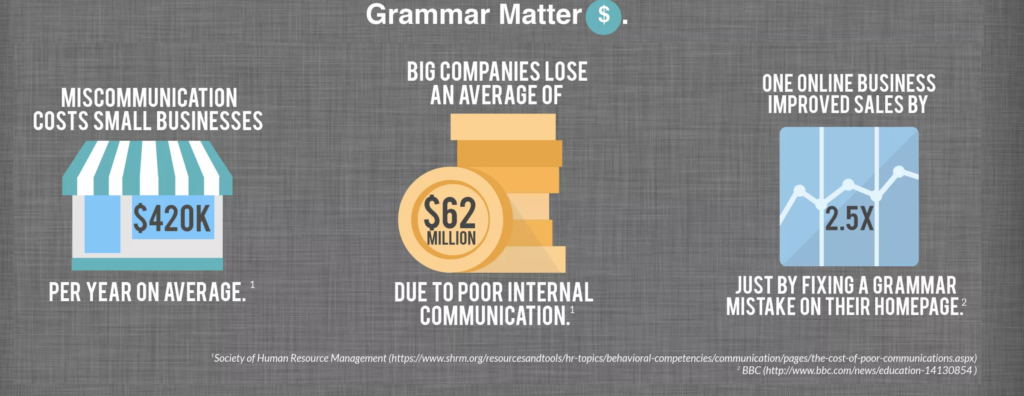As we share our ideas more rapidly than ever across multiple digital mediums each day, professionals everywhere are wondering: How important is grammar in business, really? We’re writing more casually across platforms like Slack and social media. So with all this speed of communication… Does grammar still matter?
Today, we’ll answer this question by sharing the latest research on the importance and impact of grammar in business. Because despite technological advances like autocorrect, spell check, and Grammarly, professionals still struggle to write correctly and effectively at work. Our writing skills (or lack thereof) drastically impact our ability to be understood. Respected. Heard. If you want professional respect and enthusiasm for your ideas, you must invest in your business writing skills. Whilst a lot of business takes place online which enables useful grammatical services like Grammarly to save our blushes, there is still a lot more we can do to avoid the pitfalls of poor grammar. Communication is critical which is why businesses don’t shy away from learning all things sip trunks before deciding how they see fit to conduct their calling communications. So, why do we fail to pay the same attention to how we communicate in the written form?
Now let’s explore the latest insights on why grammar still matters at work.
Strong writing skills are directly tied to promotion potential and your company’s financial success. According to employers, writing is a top 3 most desirable quality of employees and job candidates. A recent study by The National Commission on Writing found that more than half of 120 American corporations took writing skills into account when making promotion decisions, and a completely different study found that employees who were not promoted into leadership positions within the first 10 years of their careers made two and a half times as many grammar mistakes as those who were promoted.
INCREASE YOUR PROFESSIONAL POTENTIAL BY JOINING OUR SELF-PACED ONLINE WRITING COURSE FOR BUSY PROFESSIONALS!
Let’s zoom out too and think about the importance of writing from your company’s perspective. If the stakes are high for individuals, the stakes are even higher at the organizational level. Grammar mistakes and lack of clarity cost companies thousands, even millions, of dollars. The Society for Human Resource Management recently released a study found that for small businesses the average loss for miscommunication each year is $420,000. Now for big companies the average loss is $62 million, all because of poor internal communication. Looking externally, BBC News reported that businesses lose millions of dollars every year due to typos and grammar mistakes. One case study that we discovered revealed that a small online business improved their sales by two and a half times just by fixing a grammar mistake that was on their homepage. Grammar and style matter to earning potential. Employers, managers, colleagues, and customers’ views of competence and performance are also shaped by perception of grammar skills.
“Grammar and style not only matter to earning potential, but also to employers, managers, colleagues, and customers’ views of competence and performance.”
We live in a world where people make decisions and impressions very quickly. Research has shown us that we get about seven seconds to make a good first impression when we’re meeting someone in person. The same goes for the writing that we produce. People are more likely to call into question your authority, your competence, and quality of your ideas when they see mistakes or feel confused by your writing.
[Tweet “”If you aren’t writing with confidence and strength, you’re holding yourself back from becoming your ideal professional self.””]
With stakes this high, we need to rely on more than spell-checkers and language calculations for our communication needs. Instead, we need to build grammar skills that set the foundation for clear and confident writing communications. As writing consultants for some of the world’s most innovative organizations, we’ve identified best practices in how to develop these skills. We want you to think of these as five levels, because they build upon each other and get more complex as you go.
Untold Content’s 5 Levels of Effective Business Writing™are:
Level 1: Write Correctly
Grammar know-how can ensure that you come across as knowledgeable. Grammar mistakes may not be easy to correct, but they are easy to spot. Be sure to know how to use commas, semicolons, and apostrophes with confidence!
Level 2: Write Clearly
Grammar know-how can help you get your point across the first time. The way we frame our ideas impacts how they are understood. Pay close attention to how you structure your sentences and share the most important information first!
Level 3: Write Concisely
Grammar know-how can make sure your writing is efficient and easy to understand. Get your point across more quickly by eliminating excessive wording and passive voice in your writing.
Level 4: Write with Context in Mind
Grammar know-how can deliver your message to a multitude of audiences. Pay close attention to your audience and write with their perspective in mind to ensure understanding.
Level 5: Write with Culture in Mind
Grammar know-how can make your writing more inclusive. Reach more people with your writing by prioritizing your audience’s cultural contexts.
We dive even deeper into these 5 topics within our online course, Wordsmith: A Grammar and Writing Course. By advancing through each of these five levels and arriving at the end of Wordsmith, you will have formed a solid foundation for your business writing habits. Each level begins with a video case study––a relevant, engaging example of why the lessons matter and what stakes they hold in the real business world. All of these resources are going to help you incorporate our knowledge into your writing process and help you become a better, faster, more deliberate writer and communicator at work. If you are missing out on any of these 5 levels of writing, you are holding yourself back from becoming your ideal professional self.



